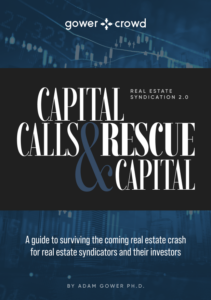Andrew Baum, Professor of Practice Saïd Business School, University of Oxford
How Blockchain Will Change Real Estate Investing
 Today's Guest Professor Andrew Baum
Today's Guest Professor Andrew Baum
Today’s episode was an absolute eye-opener for me and completely reoriented my understanding of blockchain technology. Andrew Baum is the Professor of Practice at the University of Oxford’s Saïd Business School and an expert on crypto/blockchain/tokenization technology. Admittedly, I’ve avoided this emergent area for quite some time, but Prof. Baum finally has me on board.
The transition to blockchain in the real estate industry can and will be as simple and worthwhile as the transition from hard copy contracts to email signatures. Not so scary after all is it? Find out more from Prof. Baum in this fascinating podcast.
What You're Going to Learn
- What is the Global Blockchain System?
- Understanding Blockchain with a Tractor Analogy
- Why Bitcoin Is So Volatile
- How Attaching Real Estate to Blockchain Can Create Price Stability
- Creating a Regulated Real Estate Company with Blockchain
- Eutopia: A Fully Digitized Real Estate Industry
- How Blockchain Eliminates Errors In Real Estate
- Property Funds: A Successful Example of Blockchain-enabled Real Estate
- And much more!
Related Article: How Will Blockchain Change Real Estate?
Listen To or Watch the Full Podcast Here
Show Highlights
What is the Global Blockchain System?
Andrew: Blockchain is the underpinning technology underneath Bitcoin, originally and then, more popularly, Ether. So, Ether is becoming much more broadly adopted as the sort of global blockchain system. Ether is a sort of a currency which is slightly more universal, I think, for the purposes that we're talking about.
We're talking about a unit of exchange, which is traded digitally, seamlessly, by people through apps, that sits somewhat outside the global financial system, and the banking system. Any currency can work, as long as the people on both sides of the transaction agree that it's what it is. I could agree to buy your car for three BOMBs, and as long as we- you accept what a BOMB is, and I accept what a BOMB is.
It doesn't have to have any physical value. It could be a plastic disc, but as long as that plastic disc is not easily replicated by other people, then it's got value. The point about cryptocurrency is it can't be replicated; it's issued in finite quantities.
Why Bitcoin Is So Volatile
Andrew: Bitcoin becomes incredibly volatile. People buy Bitcoin. They can make a huge amount of money, they can lose a huge amount of money because the Bitcoin is not underpinned by any intrinsic value at all. So, the value of Bitcoin is completely in the heads of all the people who are interested in trading Bitcoin. If somebody puts the message out that Bitcoin has fallen in value and will fall in value, people start selling it; the word goes around, and suddenly the price crashes. There's no floor. There's absolutely no floor because it has no intrinsic value.
How Attaching Real Estate to Blockchain Can Create Price Stability
Andrew: Really, you end up in a situation where you would like to underpin the value of the bitcoin with something physical, with an intrinsic value. Property's fantastic for that because property is not volatile; it's the absolute opposite. If you're a bitcoin speculator, and you've got ... Let's say you've got $500 million worth of bitcoin, wouldn't it be great to take the volatility out of that by attaching it to a £500 million property portfolio? Then, the value of your Bitcoin can only go up or down if the property portfolio goes up or down in value.
Now, you wouldn't do that with Bitcoin because Bitcoin's already got its own market. You'd have to create another cryptocurrency. Let's call it Propcoin. You'd say that $1 U.S. dollars' worth of this real estate portfolio is what you're trading for one Propcoin. So, you have a property fund with $500 million worth of real estate in it, and there are 500 million Propcoin tokens in circulation. Each Propcoin token is worth $1 to begin with. It's can't rise in value much above the value of the real estate portfolio, and it can't fall in value much below the value of the real estate portfolio.
Creating a Regulated Real Estate Company with Blockchain
Andrew: You can create a company out of the piece of real estate and split that into a thousand pieces, and once you do that, you are creating a tradable security, and it will be called a secure- if you want to call it a token - and we'll come onto that in a minute - it'll be a security token, treated just like any other security. It will be regulated by the SEC, or the Financial Conduct Authority in the UK.
Immediately, you're back in the system. The whole point of being in crypto, or tokenization is that you're outside the system to some extent. Well, you're back in the system now because you've had to create a company. The company is going to be regulated, probably. The manager of the company is going to be regulated. The token, itself, is going to be a security token, and therefore regulated. All the costs that go along with that, and all the lumpiness that goes along with that means that you've failed to create this sort of beautiful new world that you wanted to create.
Further, as you quite rightly pointed out, somebody has to be in control of this. If you've got a building which is split into a thousand pieces, you cannot possibly have a system where you need a thousand signatures to agree that you're going to replace a window, so somebody has to be elected to be in charge of this.
Property Funds: A Successful Example of Blockchain-enabled Real Estate
Andrew: The most likely, and the most likely successful, and currently occurring example of blockchain-enabled real-estate transactions is property funds. We say this in the report quite strongly; this is our strong conclusion that jumping from a single building, to a fractionalized interest, to a token representing that fraction, to blockchain being used to underpin that, to even using a cryptocurrency to measure your interest in that requires several huge leaps of faith.
FOR REAL ESTATE DEVELOPERS
THE WHITE BOARD WORKSHOP
Learn the exact system best of class sponsors use to raise money online.















